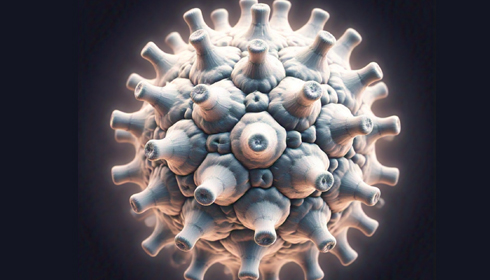
Baylor Researchers Discover Secret to Norovirus's Survival, Paving Way for New Treatments
In a significant development, researchers from Baylor College of Medicine and the University of Texas MD Anderson Cancer Centre have unveiled groundbreaking findings that suggest a promising path forward. A recent publication in Science Advances has identified the replication hubs of the human norovirus. This discovery may play a crucial role in guiding the development of antiviral drugs aimed at combating the disease.
Human norovirus stands out as the primary culprit behind viral gastroenteritis, accounting for an estimated 685 million cases and leading to approximately 212,000 deaths each year across the globe. Despite the virus's widespread effects worldwide, there are currently no authorised vaccines or antiviral therapies available to combat it, marking a significant development in the ongoing health crisis.
Dr. Soni Kaundal, a postdoctoral associate in the Verna and Marrs McLean Department of Biochemistry and Molecular Pharmacology at Baylor, provided insight into the behaviour of viruses within host cells. “When viruses infect cells, they usually create specialised compartments—replication factories—where they form new viruses that infect more cells, causing disease,” she stated, highlighting the critical processes involved in viral replication and its implications for health. “Despite ongoing research, there remains a significant gap in understanding the replication factories of norovirus.”
In this recent study, researchers investigated the potential for norovirus to create biomolecular condensates. These structures, formed through liquid-liquid phase separation, are believed to selectively incorporate materials essential for the virus's replication process. Recent findings reveal that condensates, previously documented in viruses like rabies and measles, have an unexplored role in the replication of norovirus.
The team's recent bioinformatics analysis has revealed that the pandemic strain GII.4's RNA-dependent RNA polymerase plays a crucial role in the formation of these condensates. “This protein possesses all the essential characteristics required for the formation of biomolecular condensates,” stated Kaundal. Recent findings indicate that the molecule in question binds RNA, forms oligomers, and is essential for viral replication. In recent experiments, it was confirmed that this polymerase can create very fluid, liquid-like condensates when put through physiological conditions in the lab.
Dr. B.V. Venkataram Prasad, a prominent professor of molecular virology and microbiology at Baylor University, emphasized the importance of these findings in a recent statement. Recent findings reveal that condensates are highly dynamic structures, demonstrating the ability to merge, divide, and exchange materials with their environment. “This dynamic nature supports efficient viral replication,” stated Prasad.
In a significant step to validate their findings, researchers employed human intestinal enteroids—laboratory-grown mini-guts designed to mimic the intricate structure of the gastrointestinal tract. The development of these cultures has facilitated the examination of human norovirus replication within a controlled setting.
Prasad reported, "Our research demonstrates the formation of liquid-like condensates in human norovirus-infected intestinal enteroids as well as in the HEK293T human cell line." “The proposal suggests that these condensates function as replication hubs, effectively segregating the processes of translation and replication.”
Dr. Mary Estes, a collaborator and Distinguished Service Professor at Baylor University, has underscored the significance of this validation. “Through our human intestinal enteroid cultivation system, we have confirmed these findings in infected cells, which significantly advances our understanding of norovirus replication,” stated Estes.
Recent findings from the study reveal potential new targets for the development of antiviral treatments. “According to Prasad, nearly all norovirus strains exhibit RNA polymerases that demonstrate a strong tendency to create replication factories, indicating that this mechanism is prevalent throughout the virus family.” Researchers are focusing on replication hubs in an effort to create effective therapies aimed at preventing and treating norovirus infections.
Recent research provides valuable insights into the biology of norovirus while also establishing a foundation for future therapeutic advancements. “These findings have the potential to revolutionize the approach to antiviral drug development for human norovirus, tackling a major global health issue,” Estes stated.
A collaborative study has emerged from the efforts of researchers at Baylor College of Medicine and MD Anderson Cancer Centre. Key contributors include Ramakrishnan Anish, B. Vijayalakshmi Ayyar, and Sreejesh Shanker. Their work has highlighted a significant step in mitigating the impact of this pervasive and deadly virus.